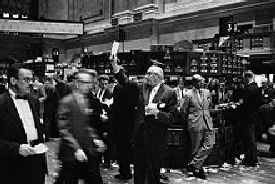  |
|
American Stock Exchange - When I began buying and selling small groups of stock shares, this was the main alternative and competitor to the NYSE in this country, and its stock listings, plus their bid and asked prices, were published in the daily newspaper, usually on the page right after those listed for the larger NYSE. Now, however, things are a bit more confused. Historically also called the AMEX, the American Stock Exchange is these days the third largest exchange, after the NYSE and the Nasdaq, is also based in New York City, and does the trades for 10% of the equities or stocks, exchange traded funds, closed end funds, and derivatives traded in the U.S. However, effective in 2008, the AMEX was acquired by NYSE Euronext, which then in 2009 changed its official name to NYSE Amex Equities.

Traditional open outcry trading - NYSE - Wikipedia |
| |   |
|